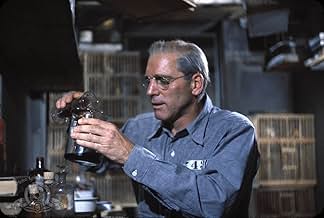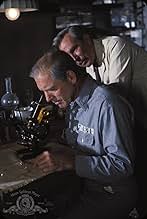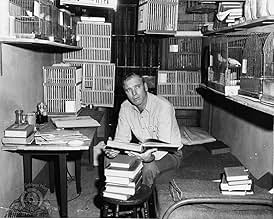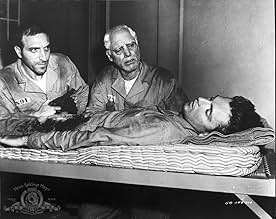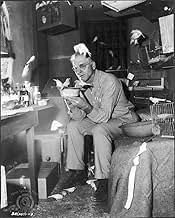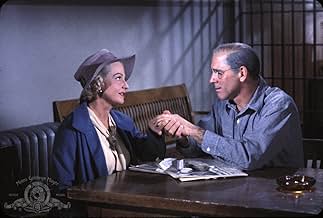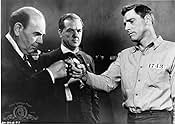ÉVALUATION IMDb
7,8/10
21 k
MA NOTE
Un meurtrier condamné et retenu en isolement permanent se rachète en devenant un ornithologue renommé.Un meurtrier condamné et retenu en isolement permanent se rachète en devenant un ornithologue renommé.Un meurtrier condamné et retenu en isolement permanent se rachète en devenant un ornithologue renommé.
- Director
- Writers
- Stars
- Nommé pour 4 oscars
- 4 victoires et 12 nominations au total
Robert Bailey
- Reporter on Dock
- (uncredited)
Nicky Blair
- Inmate
- (uncredited)
John Burnside
- Captain of Marines
- (uncredited)
Robert Burton
- Sen. Ham Lewis
- (uncredited)
Mushy Callahan
- Inmate
- (uncredited)
James J. Casino
- Inmate
- (uncredited)
James Cavanaugh
- Guard
- (uncredited)
Avis en vedette
"Birdman of Alcatraz" depicts a fictionalized version of the life of Robert Stroud, a real prisoner who served a life sentence in various American prisons, including Alcatraz.
As other viewers have commented, the film fictionalizes the life of the real Robert Stroud, who was a murderer and who has been accused of being a pedophile, as well.
This fictionalization should not interfere with an intelligent viewer's enjoyment of a fine film.
Too, this fictionalization doesn't change the key features of Stroud's case -- a bad man, a man who is shown on screen to be a real murderer, was condemned to death by the state. That much is true from Stroud's real life story, and that much is shown in the film.
Stroud was a difficult person who did not treat other people decently. That much was true of the real Stroud and that is shown in the film.
Stroud's mother pled for his life and President Woodrow Wilson commuted his sentence to life. A warden, aware of how difficult Stroud was to control, declared that Stroud be kept in segregation. That much is true in Stroud's real life story, and that is depicted in the film.
Finally, Stroud became noteworthy for his research and writing on canaries, after he found an injured bird in the recreation yard. That much was true in Stroud's life, and that is shown in the film.
Those who argue that the film is not as accurate as it could be have a point, but the film does follow the facts outlined above.
The film is quiet, and black and white, and yet riveting.
It is an example of a kind of film-making that is sadly lost today. The film attempts a serious discussion of serious issues: the value of a man, the death penalty, the role of prisons, their wardens and guards, the possibility of human connection, even under conditions of relative isolation. Stroud makes some human contact with his guard, and with a fellow inmate he communicates with via tapping.
The film is riveting because its entire cast has a kind of star power that is hard to find today. Even given his quiet, surly performance in this black and white film, you can't take your eyes off of Burt Lancaster. The supporting cast is equally excellent.
This film is a must for anyone interested in cinematic treatments of prisons, of the death penalty, of questions of human worth, even the worth of persons who display their lack of worth in, almost, their every act, and, the kind of films of the late fifties and early sixties that provided intelligent discussions of social issues.
It's also a great movie if you just want to be entertained.
As other viewers have commented, the film fictionalizes the life of the real Robert Stroud, who was a murderer and who has been accused of being a pedophile, as well.
This fictionalization should not interfere with an intelligent viewer's enjoyment of a fine film.
Too, this fictionalization doesn't change the key features of Stroud's case -- a bad man, a man who is shown on screen to be a real murderer, was condemned to death by the state. That much is true from Stroud's real life story, and that much is shown in the film.
Stroud was a difficult person who did not treat other people decently. That much was true of the real Stroud and that is shown in the film.
Stroud's mother pled for his life and President Woodrow Wilson commuted his sentence to life. A warden, aware of how difficult Stroud was to control, declared that Stroud be kept in segregation. That much is true in Stroud's real life story, and that is depicted in the film.
Finally, Stroud became noteworthy for his research and writing on canaries, after he found an injured bird in the recreation yard. That much was true in Stroud's life, and that is shown in the film.
Those who argue that the film is not as accurate as it could be have a point, but the film does follow the facts outlined above.
The film is quiet, and black and white, and yet riveting.
It is an example of a kind of film-making that is sadly lost today. The film attempts a serious discussion of serious issues: the value of a man, the death penalty, the role of prisons, their wardens and guards, the possibility of human connection, even under conditions of relative isolation. Stroud makes some human contact with his guard, and with a fellow inmate he communicates with via tapping.
The film is riveting because its entire cast has a kind of star power that is hard to find today. Even given his quiet, surly performance in this black and white film, you can't take your eyes off of Burt Lancaster. The supporting cast is equally excellent.
This film is a must for anyone interested in cinematic treatments of prisons, of the death penalty, of questions of human worth, even the worth of persons who display their lack of worth in, almost, their every act, and, the kind of films of the late fifties and early sixties that provided intelligent discussions of social issues.
It's also a great movie if you just want to be entertained.
This is a loose telling story of Robert Franklin Stroud (Burt Lancaster) who became known as The Birdman Of Alcatraz.
Have to say I have avoided this film for years purely because of its leading man, but before you Burt Lancaster fans jump on me let me say here and now that I'm now very much a convert these days. A dear on line friend of mine convinced me to check out some of his work last year after they found out I wasn't all that impressed with him, so after watching Atlantic City and his supreme film noirs, I was quickly back in line. This one landed from the rental folk strangely after me enjoying Lancaster in The Unforgiven only last week.
A strange thing with prison films is that few of them actually capture the oppressive feel of incarceration, so when I see one that does, then I'm very over the moon. Director John Frankenheimer manages to put the viewer in with Stroud because the pace is perfect, it's meant to be slow, prison time is slow time, the film is always close and intimate to give you the feel of being there. This film, much like two other greats from the genre in Papillon & Escape From Alcatraz, needs its lead actor to be restrained yet brood with menace, and Lancaster delivers from the top draw here. How unfortunate for him that he should turn in a fantastic turn in the same year that Atticus & Lawrence were dazzling cinema goers. The film never veers into over sentimental slumber because there is much more going on with Stroud, be it his Mother, business acumen, or the political fall out of this murderous man's time in prison.
Watching such macho men like Lancaster & Savalas grow fond of our feathered friends is priceless and brings about scenes that are both touching and poignant at the same time. Whatever the distortion of the facts as regards Robert Stroud's penal life, one thing we do know is that he made an official impact and it makes for one hell of a story. Added bonus here is that you've got Frankenheimer directing deftly in his black & white style, aided considerably by the smart cinematography from Burnett Guffey. And of course from a memorable performance from Big Bad Burt.
I was so impressed I ordered it for my own collection. 9/10
Have to say I have avoided this film for years purely because of its leading man, but before you Burt Lancaster fans jump on me let me say here and now that I'm now very much a convert these days. A dear on line friend of mine convinced me to check out some of his work last year after they found out I wasn't all that impressed with him, so after watching Atlantic City and his supreme film noirs, I was quickly back in line. This one landed from the rental folk strangely after me enjoying Lancaster in The Unforgiven only last week.
A strange thing with prison films is that few of them actually capture the oppressive feel of incarceration, so when I see one that does, then I'm very over the moon. Director John Frankenheimer manages to put the viewer in with Stroud because the pace is perfect, it's meant to be slow, prison time is slow time, the film is always close and intimate to give you the feel of being there. This film, much like two other greats from the genre in Papillon & Escape From Alcatraz, needs its lead actor to be restrained yet brood with menace, and Lancaster delivers from the top draw here. How unfortunate for him that he should turn in a fantastic turn in the same year that Atticus & Lawrence were dazzling cinema goers. The film never veers into over sentimental slumber because there is much more going on with Stroud, be it his Mother, business acumen, or the political fall out of this murderous man's time in prison.
Watching such macho men like Lancaster & Savalas grow fond of our feathered friends is priceless and brings about scenes that are both touching and poignant at the same time. Whatever the distortion of the facts as regards Robert Stroud's penal life, one thing we do know is that he made an official impact and it makes for one hell of a story. Added bonus here is that you've got Frankenheimer directing deftly in his black & white style, aided considerably by the smart cinematography from Burnett Guffey. And of course from a memorable performance from Big Bad Burt.
I was so impressed I ordered it for my own collection. 9/10
BURT LANCASTER seldom had a role that he connected with more than his portrait of an embittered man who must spend his life in prison after murdering a prison guard. His muted performance of this stoic man is under close scrutiny by the camera as he gradually redeems himself through a chance encounter with a fallen sparrow.
Everyone in the cast is superb--Karl Malden as a hard-nosed warden, Telly Savalas as a fellow prisoner, Betty Field as the widow who becomes close to Stroud through a mutual interest, and particularly Thelma Ritter as an over possessive mother. The refusal of a prison guard to permit Lancaster to see his mother is the catalyst that sends Stroud into solitary when the guard is fatally stabbed.
The scene where Stroud breaks down and actually apologizes to a prison guard (Neville Brand) is one of the most powerful moments in the film with Brand speaking up to the defiant prisoner who treats the guards with contempt.
All of the scenes showing Stroud taking care of his birds are startlingly realistic. Through brilliant black and white photography and a compelling script--and under the superior direction of John Frankenheimer--the film will move you to tears on more than one occasion and provides a vast range of emotions for the viewer. Burt Lancaster's finest achievement as an actor.
Interesting to note that only Burt Lancaster and Thelma Ritter were nominated for Oscars. Karl Malden and Neville Brand also deserved Oscar nominations--as did the film.
Everyone in the cast is superb--Karl Malden as a hard-nosed warden, Telly Savalas as a fellow prisoner, Betty Field as the widow who becomes close to Stroud through a mutual interest, and particularly Thelma Ritter as an over possessive mother. The refusal of a prison guard to permit Lancaster to see his mother is the catalyst that sends Stroud into solitary when the guard is fatally stabbed.
The scene where Stroud breaks down and actually apologizes to a prison guard (Neville Brand) is one of the most powerful moments in the film with Brand speaking up to the defiant prisoner who treats the guards with contempt.
All of the scenes showing Stroud taking care of his birds are startlingly realistic. Through brilliant black and white photography and a compelling script--and under the superior direction of John Frankenheimer--the film will move you to tears on more than one occasion and provides a vast range of emotions for the viewer. Burt Lancaster's finest achievement as an actor.
Interesting to note that only Burt Lancaster and Thelma Ritter were nominated for Oscars. Karl Malden and Neville Brand also deserved Oscar nominations--as did the film.
There are many combinations in Hollywood that produce fine work; and, then, there are those that produce tremendous work. Directors and actors can often be at odds, but when they are in sync, something wonderful can come of it. Hitchcock made classics with Jimmy Stewart and Cary Grant; Scorcese and Deniro transcend their contemporaries; and Burt Lancaster and John Frankenheimer made great movies together.
I've always liked Burt Lancaster. At first, I had only seen his swashbucklers and his westerns. But, as I discovered his dramas, my respect grew. Lancaster was the perfect leading man. He was tall, good looking, charming, and loaded with charisma. What's more, he had talent. He could turn out a pirate yarn or play a con artist who finds love; a marshall in the most famous gunfight, or a general who abandons his oath; a ghost of a doctor who gets that one at-bat, or a prisoner who becomes an expert on birds. Lancaster is brilliant in this film.
Lancaster was more than a movie star; he was an actor. He never sought the easy route, his life had never been easy. Maybe that's why his movies stand out. Nothing good ever comes easy.
Lancaster presents a brilliant portrayal of Robert Stroud. Whether it is historically accurate or not is beside the point. Lancaster represents the indomitable human spirit; no matter what challenge life throws at him, he rises above. Lancaster is understated in this role, but so powerful. He doesn't need method or make up or any tricks; just his humanity.
So many movies shine due to the presence of Lancaster; but his collaborations with Frankenheimer shine brightest. Frankenheimer is highly underrated, due to his later work; but, there was a period when he was one of the best. The Manchurian Candidate, Seven Days in May, The Train, and Birdman of Alcatraz are clear examples of his talent. Do yourself a favor, when you see a movie in the video store, or on tv, look for the names Frankenheimer and Lancaster. If you find them, watch the movie. You'll be glad you did.
I've always liked Burt Lancaster. At first, I had only seen his swashbucklers and his westerns. But, as I discovered his dramas, my respect grew. Lancaster was the perfect leading man. He was tall, good looking, charming, and loaded with charisma. What's more, he had talent. He could turn out a pirate yarn or play a con artist who finds love; a marshall in the most famous gunfight, or a general who abandons his oath; a ghost of a doctor who gets that one at-bat, or a prisoner who becomes an expert on birds. Lancaster is brilliant in this film.
Lancaster was more than a movie star; he was an actor. He never sought the easy route, his life had never been easy. Maybe that's why his movies stand out. Nothing good ever comes easy.
Lancaster presents a brilliant portrayal of Robert Stroud. Whether it is historically accurate or not is beside the point. Lancaster represents the indomitable human spirit; no matter what challenge life throws at him, he rises above. Lancaster is understated in this role, but so powerful. He doesn't need method or make up or any tricks; just his humanity.
So many movies shine due to the presence of Lancaster; but his collaborations with Frankenheimer shine brightest. Frankenheimer is highly underrated, due to his later work; but, there was a period when he was one of the best. The Manchurian Candidate, Seven Days in May, The Train, and Birdman of Alcatraz are clear examples of his talent. Do yourself a favor, when you see a movie in the video store, or on tv, look for the names Frankenheimer and Lancaster. If you find them, watch the movie. You'll be glad you did.
I've just seen this film on TV, it being several years since I saw it last. What a fine job Burt Lancaster makes of portraying Robert Stroud, a two-times murderer who finds inner peace when he nurses a young sparrow back to health in his prison cell. More birds follow, and in time he becomes an authority on bird pathology and develops several cures for diseases which were thought untreatable.
The quiet dignity that Lancaster gives to the part may or may not have been a genuine part of the real Robert Stroud but it is deeply moving, and the Director's careful treatment of the relationship he has with his long-term warder who grows old alongside him is one part of the film which can bring a lump to the throat.
Of course the film carries the message that not all prisoners should be treated with brutal disdain and could be seen as just another left-wing handwringer from a period when this kind of thing was popular among movie-makers, but it is certainly a top-notch example.
The quiet dignity that Lancaster gives to the part may or may not have been a genuine part of the real Robert Stroud but it is deeply moving, and the Director's careful treatment of the relationship he has with his long-term warder who grows old alongside him is one part of the film which can bring a lump to the throat.
Of course the film carries the message that not all prisoners should be treated with brutal disdain and could be seen as just another left-wing handwringer from a period when this kind of thing was popular among movie-makers, but it is certainly a top-notch example.
Le saviez-vous
- AnecdotesBurt Lancaster was so immersed in his role that he wept on some occasions, but he asked director John Frankenheimer not to show him cry to the audience.
- GaffesWhile Stroud is at Alcatraz, his cell is depicted with a window. All the cells at Alcatraz were located on inside walls with no openings to the outside.
- Citations
[last lines]
Robert Stroud: Tom? You know what they used to call Alcatraz in the old days?
Tom Gaddis: What?
Robert Stroud: Bird Island.
Tom Gaddis: [narrating] Robert Stroud's petition for parole has been denied annually for 24 years. Age 72, he is now in his 53rd year of imprisonment.
- Autres versionsEuropean release is five minutes longer than original US theatrical version.
- ConnexionsFeatured in Film Review: Burt Lancaster (1968)
Meilleurs choix
Connectez-vous pour évaluer et surveiller les recommandations personnalisées
- How long is Birdman of Alcatraz?Propulsé par Alexa
Détails
- Date de sortie
- Pays d’origine
- Langue
- Aussi connu sous le nom de
- Birdman of Alcatraz
- Lieux de tournage
- Alcatraz Island, San Francisco Bay, Californie, États-Unis(exteriors: long shots)
- société de production
- Consultez plus de crédits d'entreprise sur IMDbPro
Box-office
- Budget
- 2 650 000 $ US (estimation)
- Durée2 heures 27 minutes
- Couleur
- Rapport de forme
- 1.85 : 1
Contribuer à cette page
Suggérer une modification ou ajouter du contenu manquant

Lacune principale
By what name was Le prisonnier d'Alcatraz (1962) officially released in India in English?
Répondre

